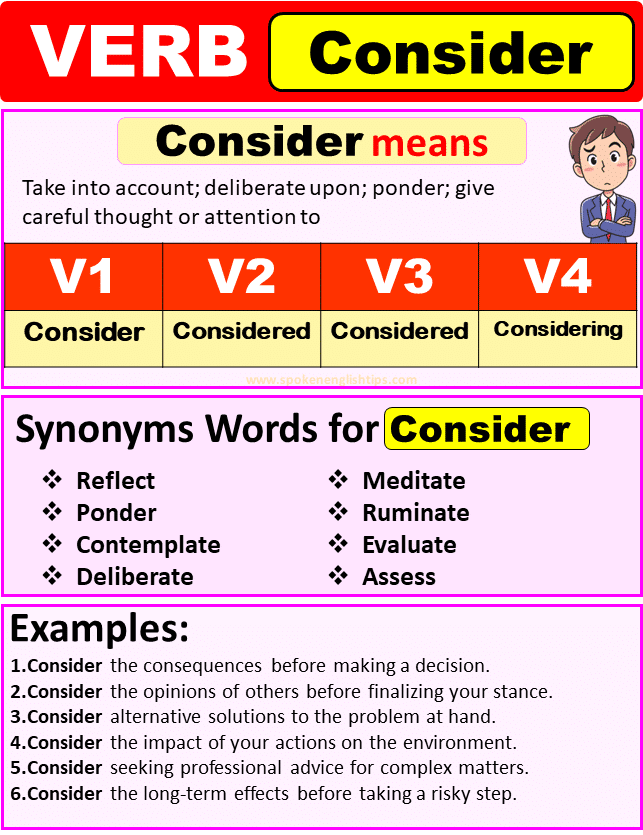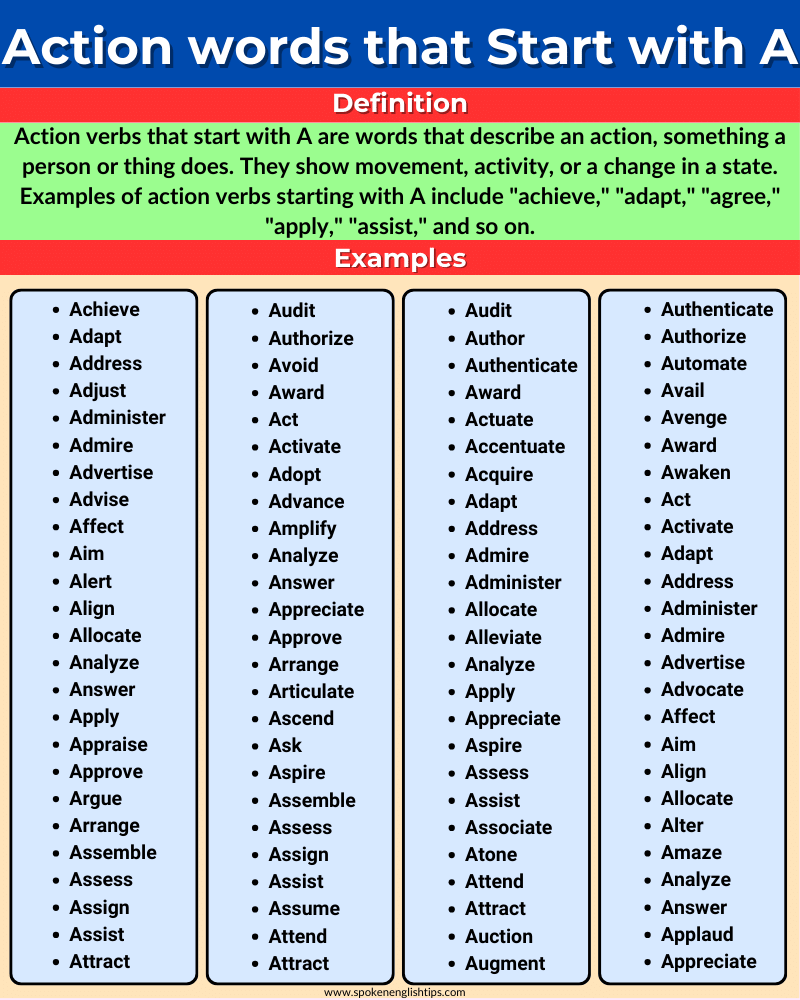Consider Verb Forms, Base Form, Past Tense, Past Participle & V1 V2 V3
| 1. | Base Form (Infinitive) (V1): | Consider |
| 2. | Simple Past (V2): | Considered |
| 3. | Past Participle (V3): | Considered |
| 4. | Present Participle (-ing): | Considering |

See Also | List of Verbs V1 V2 V3 V4 Pdf Download
Consider Past Tense
| Considered |
| Considered is the past tense of the Consider word. |
Answer Past Participle
| Considered |
| Considered is the past participle of the Consider word. |
Consider Verb forms V1 V2 V3 V4
| Infinitive | Past Simple | Past Participle | Present Participle |
| Consider | Considered | Considered | Considering |
Conjugation of Consider
| Tense | Conjugation | Example |
|---|---|---|
| Present Indefinite | Consider | I consider my options. |
| Present Continuous | Am/Is/Are considering | She is considering a career change. |
| Present Perfect | Have/Has considered | They have considered the proposal. |
| Present Perfect Continuous | Have/Has been considering | He has been considering the offer. |
| Past Indefinite | Considered | We considered different options. |
| Past Continuous | Was/Were considering | The team was considering a new strategy. |
| Past Perfect | Had considered | She had considered the consequences. |
| Past Perfect Continuous | Had been considering | He had been considering the possibilities. |
| Future Indefinite | Will/Shall consider | I will consider your suggestion. |
| Future Continuous | Will/Shall be considering | They will be considering the options. |
| Future Perfect | Will/Shall have considered | He will have considered all the factors. |
| Future Perfect Continuous | Will/Shall have been considering | She will have been considering the matter. |
Synonyms of Consider
- Reflect
- Ponder
- Contemplate
- Deliberate
- Meditate
- Ruminate
- Evaluate
- Assess
- Examine
- Scrutinize
- Analyze
- Think over
- Weigh
- Mull over
- Debate
- Review
- Reckon
- Judge
- Gauge
- Appraise
Consider Verb Examples With V1 V2 V3
- Consider the consequences before making a decision.
- Consider the opinions of others before finalizing your stance.
- Consider alternative solutions to the problem at hand.
- Consider the impact of your actions on the environment.
- Consider seeking professional advice for complex matters.
- Consider the long-term effects before taking a risky step.
- Consider different perspectives to broaden your understanding.
- Consider the potential benefits and drawbacks before committing.
- Consider the needs and feelings of those around you.
- Consider all available options before choosing the best course of action.
Read Also More Verbs:
Frequently Asked Questions
Q: What does the verb “consider” mean?
A: The verb “consider” means to think about or contemplate something carefully before making a decision or forming an opinion. It involves examining different aspects, evaluating options, and weighing the pros and cons.
Q: How is “consider” used in a sentence?
A: “Consider” can be used in various contexts, but here’s an example: “I am considering taking a vacation next month.”
Q: Can you highlight the verb “consider” in the previous sentence?
A: “I am considering taking a vacation next month.”
Q: What are some synonyms of the verb “consider”?
A: Some synonyms of “consider” include contemplate, ponder, think about, reflect on, deliberate, and mull over.
Q: Is “consider” a transitive or intransitive verb?
A: “Consider” can be used both as a transitive and intransitive verb. When used transitively, it takes a direct object, such as “I consider him a friend.” When used intransitively, it doesn’t require a direct object, like “I am considering my options.”
Q: Can “consider” be used in formal writing?
A: Yes, “consider” is commonly used in formal writing, such as academic papers, professional emails, and reports. It adds a thoughtful and analytical tone to the writing.
Q: How does “consider” differ from “think about” or “ponder”?
A: While “think about” and “ponder” convey a similar meaning to “consider,” the verb “consider” often implies a more deliberate and systematic thought process. It suggests actively weighing different factors and potential outcomes before reaching a conclusion.
Q: Are there any idiomatic expressions related to the verb “consider”?
A: Yes, there are a few idiomatic expressions related to “consider.” For example, “take into consideration” means to factor in or think about something when making a decision. “Consider it done” implies that a request or task will be fulfilled without hesitation.
Q: Can you provide an example of an idiomatic expression using the verb “consider”?
A: Certainly! “Before making a final decision, we need to take all the relevant factors into consideration.”


